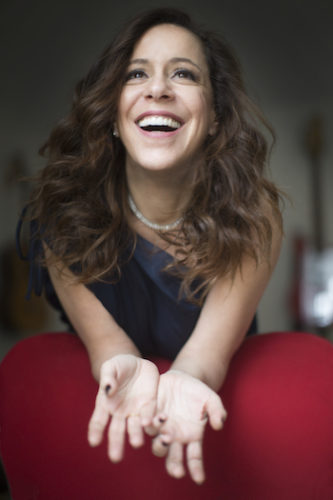Concert Review: Sergio Mendes & Bebel Gilberto — 60th Anniversary of Bossa Nova
By Evelyn Rosenthal
For Sergio Mendes, the captivating anniversary show was a chance to look back on the early years of bossa nova and its birthplace.
Sergio Mendes & Bebel Gilberto: 60th Anniversary of Bossa Nova. Presented by Celebrity Series of Boston at Berklee Performance Center, on Friday, October 19.

Sergio Mendes. — he brought great Brazilian music to other parts of the world. Photo: courtesy of Celebrity Series.
Musical anniversaries are funny things. The most notable ones focus on years ending in a zero or a five (10th, 50th, 75th, etc.), and they’re occasions for honoring musicians and composers by organizing shows, releasing (and rereleasing) recordings, and interviewing the relevant subjects. In 2008, we celebrated the 50th anniversary of Brazil’s iconic musical contribution, the sound called “bossa nova,” and the flow of its lilting rhythms and jazz-inflected harmonies into most corners of the world. The birth of the music is traditionally considered the 1958 release of the seminal bossa nova recording, João Gilberto’s version of Antonio Carlos Jobim’s “Chega de saudade.” So I scratched my head a bit at the “60th anniversary” tag for this Celebrity Series of Boston’s show featuring the seemingly ageless Brazilian music popularizer Sergio Mendes and second-generation bossa nova singer Bebel Gilberto, which was clearly a year late. But really, who needs an anniversary—or any other excuse—to celebrate bossa nova?
Though sometimes equated with its pale, elevator- and “lounge”-music imitations, the real thing, delivered by those who invented, grew up with, or seriously studied it, can be transporting. And so it was at Friday’s sold-out Berklee Performance Center concert.
Opener Bebel Gilberto is a sultry-voiced singer who first made a splash in 2000 with her album Tanto Tempo, putting an electronica spin on bossa nova. Born in New York—and raised there and in Brazil—Bebel couldn’t have stronger bossa credentials: her father, the above-mentioned João, basically created the rhythm with his signature guitar style, and her mother, the singer Miúcha (João’s second wife, post-Astrud, and sister of the great composer/lyricist Chico Buarque), recorded three albums with the creator of its most indelible compositions, Tom Jobim. It’s not surprising that Bebel signed on to this anniversary tour: it presents a timely opportunity to honor her parents—both of whom died within the past year—and the music she grew up with.
Bebel’s open, free-spirited approach was evident from the first number, as she danced to the rhythm of Jobim’s “Wave,” the skirt of her dress (appropriately) swaying. Expertly accompanied by fellow Brazilians (and former Berklee students) Guilherme Monteiro (guitar) and Léo Costa (drums/percussion), she took the audience on a delightful ride through some of bossa nova’s greatest hits, including Jobim’s “Corcovado,” “Desafinado,” “Só danço samba,” and “Aguas de março” (Waters of March), which appeared as a bonus coda quote in her version of Carlos Lyra’s “Você e eu.” Marcos Valle’s “Summer Samba (So Nice)” smoothly segued into the theme from the 1966 French film A Man and a Woman, and Bebel gestured for the audience to join in “ba-ba-da-ba-da”-ing the melody (a snag was hit at the bridge, which no one remembered). Other highlights: a trippy reading of the English version of Caetano Veloso’s Tropicalismo hit “Baby”; a few old-style sambas (precursors and rhythmic cousins of bossa nova); the arrangement her parents recorded of Cole Porter’s “Just One of Those Things,” in tribute to them; and a spirited “O pato” (The Duck), a classic of João’s repertoire, in which she channeled the title critter with flowing arm movements.
A warm, welcoming performer with an endearing, slightly eccentric vibe—complete with midset lipstick applications and an enthusiastic endorsement for Fiji Water, which she sipped at intervals—Bebel made her well-chosen set feel like more than an “opening act.” After an understated version of her father’s haunting, enigmatic composition “Undiú” (the word has no real translation, and the title is the only lyric), she ended with her hypnotic electronica arrangement of Baden Powell and Vinicius De Moraes’s “Samba da benção” (Samba of the Blessing), and offered the audience, in sweeping hand gestures, her own generous “blessing” and thanks.
While Bebel’s intimate set evoked the first-generation bossa nova musicians and composers who gathered at one another’s Rio apartments to play and share new songs, Sergio Mendes and his tight nine-piece band showed how Brazilian popular music—and his own repertoire—has expanded to a wider range of styles in the 60(ish) years since those early days. Nattily dressed in a checked suit, striped socks, and his signature hat, Mendes made his way to the keyboard and promptly tore into the rousing “Magalenha,” a song by Bahian percussionist/composer Carlinhos Brown from Mendes’s Grammy-winning 1992 album Brasileiro. Drummer Léo Costa and percussionist Gibi provided the pulse, not quite matching the recording’s full percussion ensemble, but ably conveying the energy of that style.

Singer Bebel Gilberto. Photo: Vicente de Paulo.
As it has since his Brasil ’66 days, Mendes’s lineup featured two terrific female singers—L.A.-based Katie Hampton, and his wife, the fabulous Gracinha Leporace, who’s been part of his sound since the ’70s. The two women nailed their unison singing—no mean feat, as anyone who’s tried it will tell you. (Perhaps this is where I should add, in full disclosure, that I’ve been a Mendes fan since 1968, when my father’s copy of the album Look Around led me to discover a passion for Brazilian music and, later, to sing it, in Portuguese, even starting a tribute band I dubbed “To Sergio with Love.”) In a solo spot, Leporace gave a strong performance of Chico Buarque’s “O que será (À flor da pele).” Hampton teamed up with quadruple-threat Scott Mayo—who also played keyboards, flute, and sax—on Mendes’s ’80s hit, the Barry Mann-Cynthia Weil R&B ballad “Never Gonna Let You Go.” Of course, in keeping with the evening’s theme, Mendes underlined it with a bossa nova beat.
For Mendes, the anniversary show was a chance to look back on the early years of bossa nova and its birthplace, Rio, which he compared to “Paris in the ’30s.” In multiple numbers he paid tribute to one of his own mentors, Jobim: singing solo on the jaunty “Ela é carioca” (She’s a Carioca [referring to a person from Rio]); Leporace and Hampton facing each other to reel off the lyrical lists (in both the English and Portuguese) of the masterful “Waters of March”; and Mendes’s updated version of “Agua de beber,” from his 2008 album Encanto, with rapped verses by Will.I.Am. Here, rapper H2O did the honors, with excellent vocal harmonies by Mendes, Mayo, Leporace, Hampton, and singer-songwriter/guitarist Kleber Jorge.
The band put on a clinic with an extended instrumental medley of Baden Powell’s “Consolação” and “Berimbau” featuring a lively Mendes piano solo, funky bass work from Andre De Santanna, a sax solo by Mayo, a break showcasing Gibi’s work on the traditional Brazilian percussion instruments cuica, pandeiro, and agogó, and snippets of “Desafinado,” classics “Tico-tico no fubá” and “Maracangalha,” and Airto Moreira’s “Misturada.” The show wound down, unsurprisingly, with Brasil ’66’s greatest hits, starting with “The Fool on the Hill” and “The Look of Love,” songs that epitomized Mendes’s winning formula for infusing American pop hits of the day (in this case, by the Beatles and Burt Bacharach/Hal David) with a bossa nova beat and jazzy harmonies.
But the final tunes emphasized what, for me, is Mendes’s most significant contribution: bringing great Brazilian music to other parts of the world. I eventually realized that the songs I found most thrilling on Look Around were by the likes of Edu Lobo, Gilberto Gil, Dori Caymmi, and João Donato, composers whose work he championed, in addition to Jorge Ben-Jor, and more recently, Carlinhos Brown and Guinga. By the time Mendes launched into the distinctive piano intro to Ben-Jor’s “Mas que nada” the audience was up, dancing and singing along, and Ben-Jor’s “País tropical” capped this exhilarating night of bossa nova joy with its refrain that translates “I live in a tropical country, blessed by God and beautiful by nature.” Well, maybe, like our country, not so blessed in a lot of ways these days, but still in possession of a beautiful musical heritage, well worth celebrating.
Evelyn Rosenthal is a singer specializing in jazz and Brazilian music, a freelance editor, and the former editor in chief and head of publications at the Harvard Art Museums. She writes about musical theater and music for the Arts Fuse.
